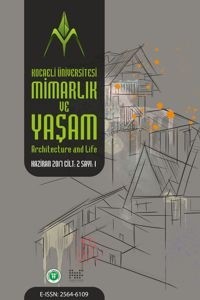Sudan Suakin Adasındaki Osmanlı Eserleri Mimari Özellikleri ve 3 Boyutlu Belgeleme Süreci
Suakin adası, Sudan’ın Kızıldeniz kıyısında, Portsudan’a 58 km. mesafede dünyaca önemli mercan kayalıkları üzerine kurulmuş bir adadır. Bu adanın en önemli özelliği, denizden çıkarılan mercan resiflerinden yapılmış binalarıdır. Stratejik konumundan dolayı ticari olarak Afrika’nın içlerine açılan bir kapı işlevi gören ve bir zamanlar zenginliğin taştığı, üzeri birçok estetik yapı (konut, cami, banka, hastane, atölye, gümrük binası v.b.) ile dolu ada, günümüzde harap haldedir. Adanın üzerindeki önemli binalar arasında, 16 ve 17. yüzyıllarda Osmanlı hükümdarlığı döneminden kalan tarihi yapılar da bulunmaktadır. Bu yazı kapsamında, yenilikçi ve çağdaş teknolojilerden destek alınarak üretilen 3 adet Osmanlı dönemi eserinin, rölöve süreci ve ölçüm işleminden çizim eylemine kadar belirlenmiş olan metodoloji aktarılacaktır. Ada üzerinde bulunan çok ender yapı malzemesi ile üretilmiş bu binaların, mimari özellikleri hakkında bilgi verilecektir. Belgeleme çalışmaları için, oldukça yüksek hız ve doğruluk sağlayan 3 boyutlu lazer tarama teknolojisinin sağladığı kazanımlar tartışılacaktır.
Anahtar Kelimeler:
Osmanlı eserleri, Suakin, Mercan taşı yapıları, 3B lazer tarama
Architectural Characteristics of Ottoman Works and their 3 Dimensional Documentation Processes in Suakin Island in Sudan
Suakin Island is an island built on the worldwide important coral reefs on the Red Sea coast of Sudan, with 58 km distance to Portsudan. The most important feature of this island is the buildings built by coral reefs removed from the sea. The island, which is functioning as a door opening to inner Africa commercially due to its strategic position and which was full of many qualified structures (dwelling, mosque, bank, hospital, workshop, customs building etc.), has been in ruins nowadays. Among the important buildings on the island there are also a custom and two mosques left from the Ottoman empery period between the 16th and 17th centuries. Within the scope of this article, in the first part the information about architectural features of the Ottoman period buildings will be given and in the second part the documentation and the preparation of the surveying which based on 3D laser scanning technology will be described.
Keywords:
Ottoman heritage Suakin, 3D laser scanning, digital survey, coral buildings,
___
- KAYNAKLAR • Hamadai, A. Hamid Suakin, the Port of Good Tidings. Khartoum: Sudan Ministry of Information and Culture, 1973. • Salim, Abdel Rahim “Suakin: On Reviving an ancient Red Sea Port City”, field report, Traditional Dwellings and Settlements Review, volume: 8, number 2. s.63-74, 1997, • Mohammed, Abdelrahman Ali & Welsby, Derek “Early States on the Nile: The Coming of Islam”, The Sudan Handbook, Edited by: John Ryle, Justin Willis, Suliman Baldo, Jok Madut Jok, Rift Valley Institude, 2012, London, UK. s.69, ISBN 978-1-84701-030-8. • Roden, David, “The Twenties Century Decline Of Suakin”, Sudan Notes and Records, vol L1, Khartoum, Sudan, 1970. • Arpa, Enver TİKA Sudan Koordinatörü, “Sevakin Adası ve Osmanlı Yapıları Hakkında Rapor”, 2009. • Hansen, E., Preservation of Suakin, Unesco, Serial No: 2970/RMO.RD/CLP, October-November 1972, Paris, September 1973. • Dahl, Gudrun and Hjort-af-ornas, Anders, “Precolonial Beja: a Periphery at the Crossroads”, Nordic Journal of African Studies 15(4): s. 473-498, 2006. • İBB Koruma Uygulama Denetim Bürosu (KUDEB) malzeme analiz raporu, 2010. • İBB Bimtaş A.Ş. Suakin Rölöve-Restitüsyon-Restorasyon proje raporları, 2010. • Greenlaw, Jean-Pierre The Coral Buildings of Suakin, Stocksfield: Oriel Press. s. 6-16., 1976. • Greenlaw, Jean Pierre, “The Island of Suakin: The History”, The Kenana Handbook of Sudan, Edited by., Peter Gwynvay Hopkins, Routledge Pub.New York, US, ISBN 13: 978-0-7103-1160-3, s.209-221, 2009.
- ISSN: 2564-6109
- Başlangıç: 2016
- Yayıncı: Kocaeli Üniversitesi
Sayıdaki Diğer Makaleler
Sinema ve Mekân İlişkisi Açısından Bilim kurgu Filmlerine Bir Bakış
Rafineri Projelerinde Planlamanın Önemi ve Başarılı Bir Planlama İçin Öneriler
Sudan Suakin Adasındaki Osmanlı Eserleri Mimari Özellikleri ve 3 Boyutlu Belgeleme Süreci
Gülhan BENLİ, Yeşim DOLUNAY YÜKSEL, Serdar AYAN
Kiesler'in Model Yapımındaki Haptik Deneyiminden Öğrenme: Harekattepe Tümülüsü'nün Diseksiyonları
Alışveriş Merkezlerinin Göstergebilimsel Çözümlemesi
Batman Çizgi Romanlarında Süreç İçerisinde Değişen Tasarım Unsurları
